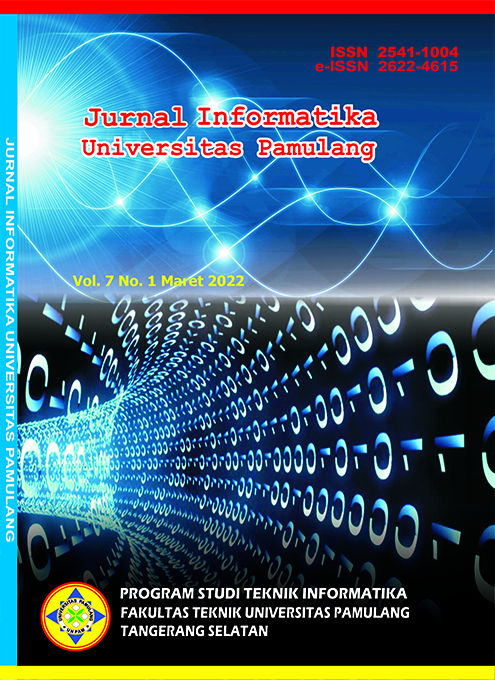Pengujian Black Box pada Aplikasi Penjualan Toko Bunga Pelangi Berbasis Web Menggunakan Metode Equivalence Partitioning
DOI:
https://doi.org/10.32493/informatika.v7i1.17523Keywords:
Testing, Black Box, Equivalence partitioningAbstract
Application or software testing requires validation to determine whether it meets the desired specifications or not. If the validation process is not perfect, it can result in imperfect data stored or processed, for example, such as when we store data in applications or software whose validation process is not perfect, it can result in errors in the data storage process. So the quality of validation must be improved to be accurate so as not to hinder the use of the software. In this study, we use Blackbox testing with the Equivalence Partitioning method, so that weaknesses in the application or software will be known after testing. The system test results show that the test can improve the quality of the application or the software is free from errors.
References
Febiharsa, D., Sudana, I. M., & Hudallah, N. (2018). Uji Fungsionalitas (Blackbox Testing) Sistem Informasi Lembaga Sertifikasi Profesi (SILSP) Batik dengan AppPerfect Web Test dan Uji Pengguna. Joined Journal (Journal of Informatics Education), 1(2), 117-126.
Hanifah, U., Alit, R., & Sugiarto. (2016). Penggunaan Metode Black Box Pada Pengujian Sistem Informasi Surat Keluar Masuk. Scan : Jurnal Teknologi Informasi dan Komunikasi, 3(3), 33-40.
Hidayat, T., & Muttaqin, M. (2018). PengujianSistem Informasi Pendaftaran dan Pembayaran Wisuda Onlinemenggunakan Black Box Testingdengan Metode Equivalence Partitioning dan Boundary Value Analysis. Jurnal Teknik Informatika UNIS, 1(1), 1-5.
Irawan, Y. (2017). Pengujian Sistem Informasi Pengelolaan Pelatihan Kerja UPT BLK Kabupaten Kudus dengan Metode Whitebox Testing. Sentra Penelitian Engineering dan Edukasi, 2(1), 59-63.
Jaya, M., Gumilang, P., Tresnawati, Andersen, Y. P., & Desyan, T. (2019). Pengujian Black Box pada Aplikasi Sistem Penunjang Keputusan Seleksi Calon Pegawai Negeri Sipil Menggunakan Teknik Equivalence Partitions. Jurnal Informatika Universitas Pamulang, 8(4), 131-136.
Krismadi, A., Lestari, A. F., Pitriyah, A., Mardangga, I. P., & Saifudin, A. (2019). Pengujian Black Box berbasis Equivalence Partitions pada Aplikasi Seleksi Promosi Kenaikan Jabatan. Jurnal Teknologi Sistem Informasi dan Aplikasi, 2(4), 155-161.
Nurudin, M., Jayanti, W., Saputro, R. D., Saputra, M. P., & Yulianti. (2019). Pengujian Black Box pada Aplikasi Penjualan Berbasis Web Menggunakan Teknik Boundary Value Analysis. Jurnal Informatika Universitas Pamulang, 4(4), 143-148.
Pramudita, R. (2020). Pengujian Black Boxpada Aplikasi EcampusMenggunakan Metode Equivalence Partitioning. Journal of Informatics, 7(5), 193-202.
Rosalina, A., Rassi, A. R., Hadi, G. Y., Ubaidillah, R., & Desyani, T. (2020). Pengujian Black Box pada Sistem Informasi Penjualan HI Shoe Store Menggunakan Teknik Equivalence Partitions. Jurnal Informatika Universitas Pamulang, 3(2), 26-29.
Zuriati, Widyawati, D. K., Sitanggang, I. S., & Buowo, A. (2018). Teknik Pengujian Boundary Value Analysis Pada Aplikasi Learning Management System Polinela. Jurnal TAM (Technology Acceptance Model), 8(2), 85-92.
Downloads
Published
Issue
Section
License
Authors who publish with this journal agree to the following terms:
- Authors retain copyright and grant the journal right of first publication with the work simultaneously licensed under a Creative Commons Attribution-NonCommercial 4.0 International (CC BY-NC 4.0) that allows others to share the work with an acknowledgement of the work's authorship and initial publication in this journal.
- Authors are able to enter into separate, additional contractual arrangements for the non-exclusive distribution of the journal's published version of the work (e.g., post it to an institutional repository or publish it in a book), with an acknowledgement of its initial publication in this journal.
- Authors are permitted and encouraged to post their work online (e.g., in institutional repositories or on their website) prior to and during the submission process, as it can lead to productive exchanges, as well as earlier and greater citation of published work (See The Effect of Open Access).
Jurnal Informatika Universitas Pamulang have CC-BY-NC or an equivalent license as the optimal license for the publication, distribution, use, and reuse of scholarly work.
In developing strategy and setting priorities, Jurnal Informatika Universitas Pamulang recognize that free access is better than priced access, libre access is better than free access, and libre under CC-BY-NC or the equivalent is better than libre under more restrictive open licenses. We should achieve what we can when we can. We should not delay achieving free in order to achieve libre, and we should not stop with free when we can achieve libre.
Jurnal Informatika Universitas Pamulang is licensed under a Creative Commons Attribution-NonCommercial 4.0 International (CC BY-NC 4.0)
YOU ARE FREE TO:
- Share : copy and redistribute the material in any medium or format
- Adapt : remix, transform, and build upon the material for any purpose, even commercially.
- The licensor cannot revoke these freedoms as long as you follow the license terms





